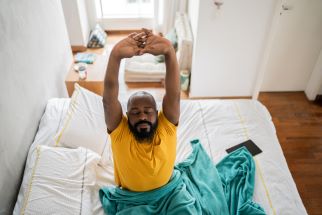November 2022
Can You Sleep Your Way to a Healthier Heart?
If you’re like most Americans, your heart health is less than optimal. According to recent research, only about 20% of tickers are in tip-top shape.
Now, though, the American Heart Association (AHA) highlights a new way to improve it: getting sufficient sleep. Here’s why—and how—to get it just right.

The newest key to success
For more than a decade, the AHA has emphasized seven important strategies to improve heart health. They are:
-
Getting enough physical activity
-
Eating a nutritious diet
-
Not smoking
-
Maintaining a healthy weight
-
Controlling cholesterol
-
Stabilizing blood sugar
-
Keeping a handle on blood pressure
In a brand-new update, AHA experts added sleep duration to this list. All together, these heart-healthy strategies are known as Life’s Essential 8™.
Why sleep matters
Slacking on sleep—or overdoing it—can cause a wide range of negative health effects, from depression to cognitive decline to heart disease.
Getting just the right amount, meanwhile, leads to:
-
A stronger immune system
-
A brighter mood
-
More resilient cells, tissues, and blood vessels
-
A sharper brain, with enhanced focus, memory, and problem-solving
-
Lower risk for chronic diseases
Poor sleep harms your heart specifically by affecting risk factors for cardiovascular disease. For instance, your blood pressure, blood sugar, and cholesterol all rise with poor rest.
Most adults need 7 to 9 hours of sleep each night, while babies and kids need even more. If you have questions about sleep or trouble getting enough shut-eye, talk with your healthcare team.
Lights out: Tips for better sleep
Phones and other devices can be barriers to good rest. To break the cycle:
-
Charge your device far away from your bed.
-
Set a bedtime alarm, so you know it’s time to unwind.
-
Turn off nighttime notifications.
-
When it’s dark, dim your screen or use a red filter app. Both can help prevent blue light from blocking production of the sleep hormone melatonin.
-
Get into the habit of putting the device down altogether at least an hour before bed.